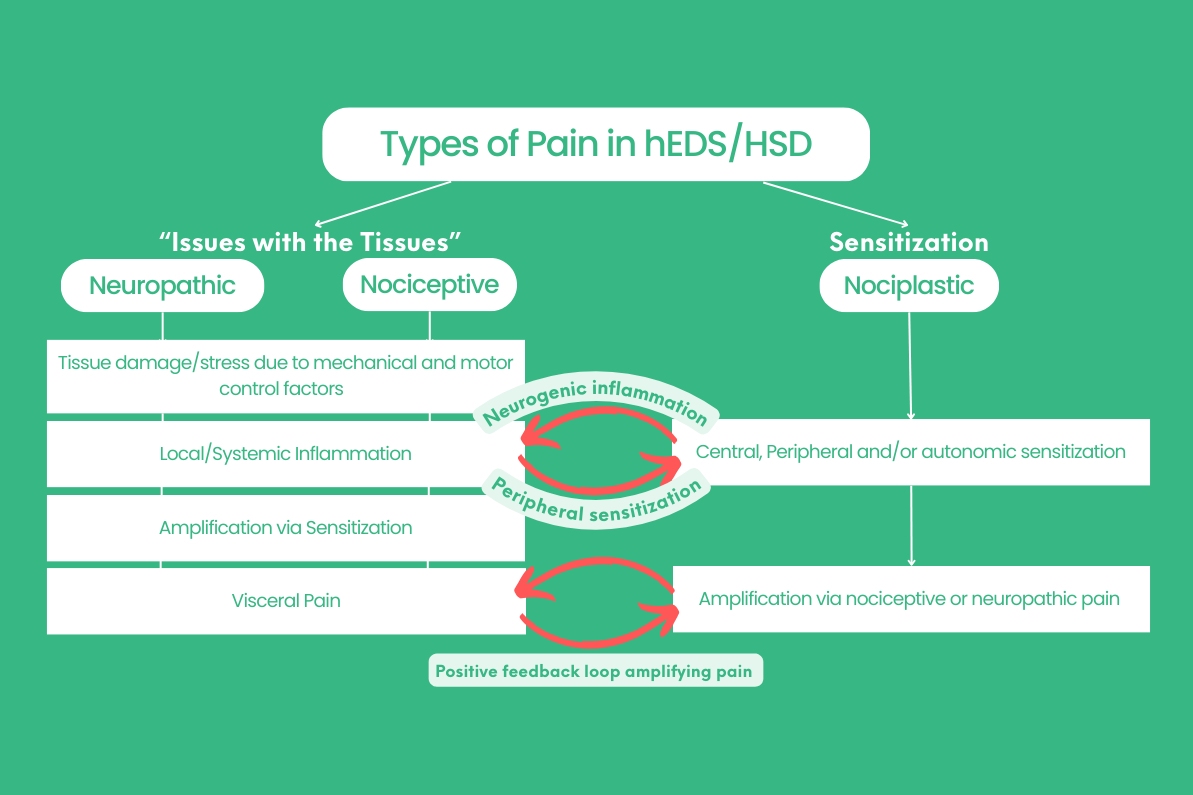 Estimated reading time: 2 minutes
Estimated reading time: 2 minutesPain is a signal from your brain that it perceives danger. There are 3 types of pain: nociceptive, neuropathic, and neoplastic. People with hypermobile Ehlers-Danlos Syndrome or hypermobility spectrum disorder (hEDS/HSD) may have any or all of these types of pain, and the relative contributions may vary from day to day or hour to hour.
What is Nociceptive Pain?
Nociceptive pain occurs in response to tissue stimulation that is causing actual or potential damage. Nerve sensors in the tissues trigger this type of pain. “Noci-” refers to pain.
These nerve sensors can be triggered by
- Mechanical stress: like subduing a joint or tearing a ligament
- Chemical stress: inflammation from a tissue injury, chemical changes from a muscle spasm, systemic inflammation like MCAS
- Temperature (hot/cold): This isn’t usually a big problem with hEDS/HSD. This is not to say we are not sensitive to temperature.
In people with HSD/hEDS, nociceptive pain is due to “issues with the tissues” – there can be tissue stress, damage, or inflammation. Visceral pain is often nociceptive due to mechanical or inflammatory irritation.
What is Neuropathic Pain?
This type is caused by actual damage, disease, or inflammation in nerves or neural tissue.” Neuro-” refers to nerves. This is also a form of “issues with the tissues” due to tissue stress, damage, or inflammation.
Think of carpal tunnel where the hand hurts or tingles even though the damage is in the wrist. Sciatica is similar – the nerve damage may be at the lumbar disc or at the piriformis muscle, but pain and tingling are felt down the leg where that nerve goes. Both of these are examples of peripheral neuropathic pain.
Neuropathic pain is fairly common in HSD/hEDS due to stress on nerves from excessive compression or stretching of nerves when the body is not properly aligned because of poor posture or the pull of gravity.
What is Nociplastic Pain?
Nociplastic pain is due to increased sensitivity in the nervous system. This sensitization makes the system more likely to activate in response to input that isn’t damaging tissues, or without any stimulus at all.
“Noci” means pain and “plastic” means adaptable or changeable. The nervous system actually changes to make neural connections that react at a lower threshold and signal pain stronger.
You can think of it like a burglar alarm system that alarms when a leaf blows by – the nervous system can react when it doesn’t have a very good reason. Or consider it a volume knob that amplifies pain.
The nervous system becomes overly sensitive because of neural inflammation or psychosocial factors like anxiety, stress, and fear. This is not an issue with the tissues, but a glitch in the nervous system. Nociplastic pain is just as real and severe as the other types.
These different types of pain can also interact with and amplify one another. Yes, it’s complicated.
Nociceptive and Neuropathic pain can trigger or flare Constant nociceptive pain due to tissue damage and inflammation can both sensitize the nervous system. Tissue irritation can irritate a sensitive nervous system, increasing sensitivity.

A sensitive central nervous system can increase inflammation in the tissues via ‘neurogenic inflammation’ that can cause inflammation in tissues that have not been damaged.

September is Pain Awareness Month and I am honored to have Dr. Leslie Russek join me to discuss pain in hypermobility. Dr. Russek PT, DPT, PhD, OCS is not only my colleague and research partner, but also the scientific advisor to The Zebra Club where she regularly shares her vast knowledge of hypermobility spectrum disorders. Find more from Dr. Russek here.
2 Comments
Kim mcrae - 12th June 2024
I have a long term sleep issue and my nervous system buzzes badly when I do sleep. I get stinging and burning skin. Will it get better?
Jeannie Di Bon - 13th June 2024
It is hard to give specific medical advice on here without knowing your history. But calming nervous system may help. Please do seek medical advice too if it persists.